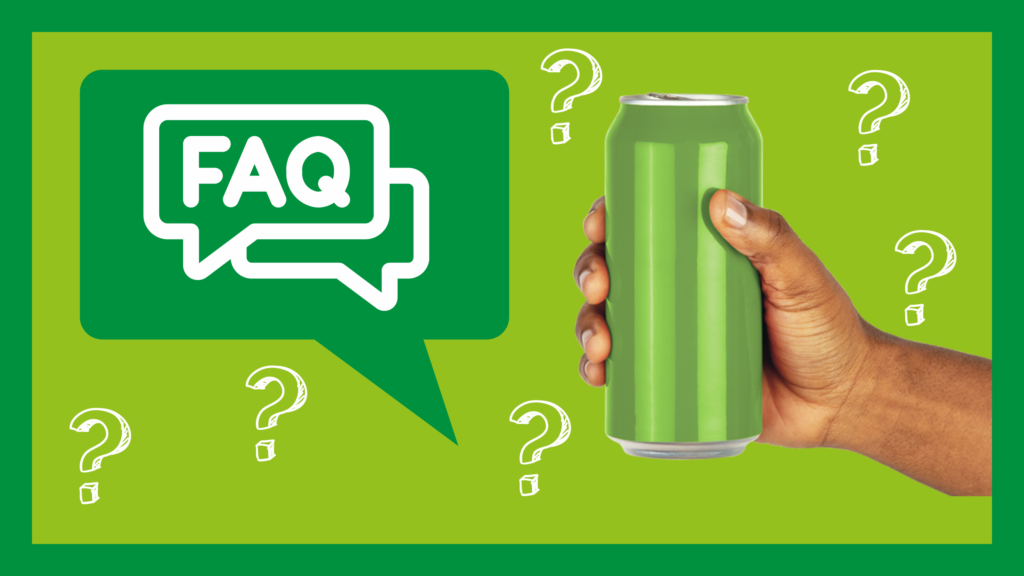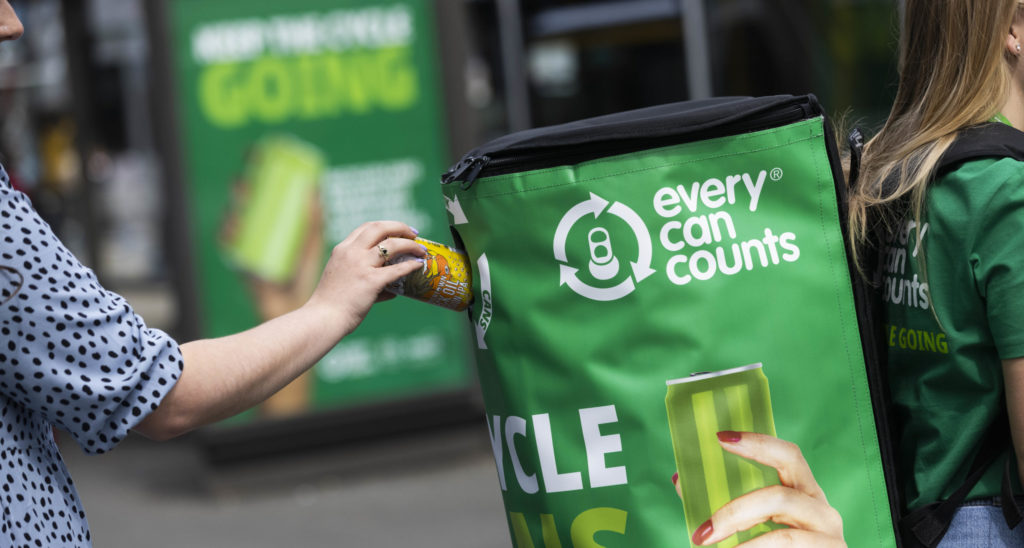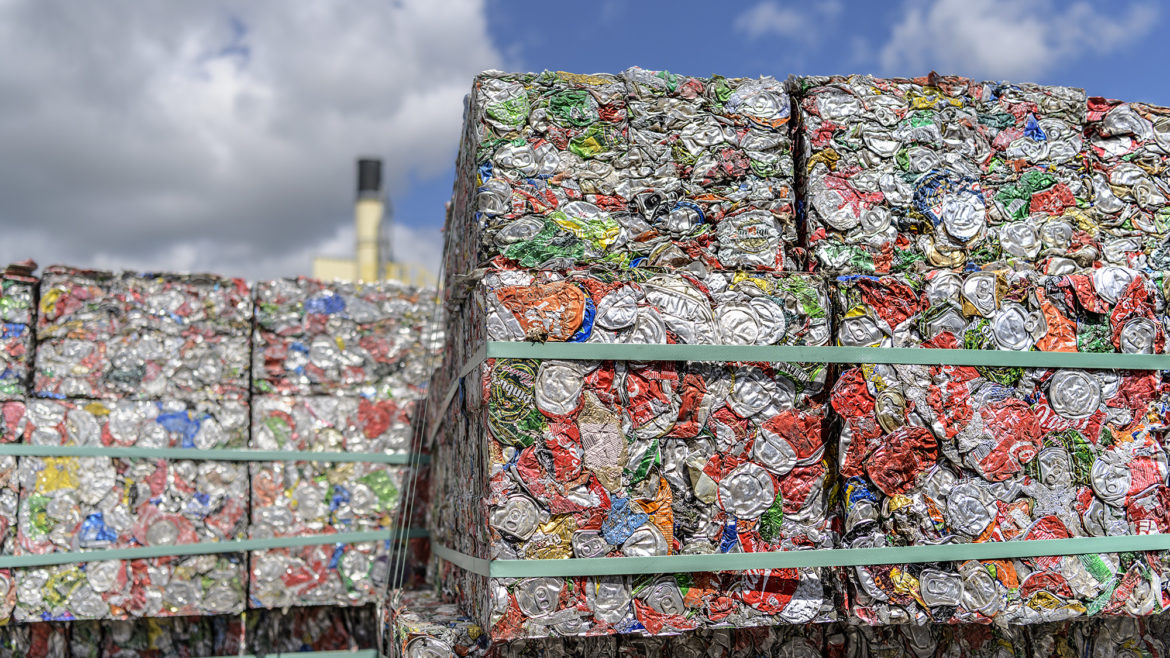There are plenty of questions you may want to ask about drink can recycling: Should I crush my drink cans before recycling? Should I wash them? Do they travel half-way around the world in order to be recycled?
But if you think that recycling your aluminium drink can should be as simple as popping it into the recycling bin, then you’re in luck; it really is that simple!
Aluminium is an infinitely recyclable material, so as long as your empty can is placed in a recycling bin, it can be back on the shop shelf as a brand-new can in just 60 days. No matter it’s size, shape or colour.
This blog will answer the burning questions you might still have about drink can recycling and debunk some of the age-old myths that continue to circulate around the internet.
So let’s get to it…

Should I crush my drink cans before recycling?
You do not have to crush your empty drink cans. Some people crush their recycled cans to create more room in their recycling bin, but this is optional. Your can is equally recyclable either way!
Both crushed and uncrushed cans are separated from other recyclables at the sorting facility (also called a materials recovery facility) using electric currents. These currents are called eddy currents or Foucault’s currents. To learn more about the drink can recycling process, you can visit our dedicated web page by clicking here.
Do cans have to be sent thousands of miles away to be recycled?
Over 90% of drink cans collected in the UK are recycled within Europe.1 The majority of cans recycled in the UK are melted down at a large plant in Warrington, Cheshire. This single plant has the capacity to recycle all of the cans sold in the UK. But there are plenty of other options around too, with over 220 aluminium recycling plants spread across Europe!2
How much energy does it take to recycle drink cans?
Recycling cans uses 95% LESS energy than creating new ones from raw materials. So recycling cans leads to huge energy savings as well as savings in greenhouse gas emissions. In fact, recycling one aluminium can saves enough energy to recharge almost 20 smartphones!3
Does the plastic coating on the inside of a can mean that they can’t be recycled?
Manufacturers have used food-grade, polymer-based can coatings for decades as a protective barrier between the metal and the products in the can. The purpose of coatings is to extend product shelf life, and to ensure that the quality and taste of the product remain as intended until the consumer opens it.
Importantly, these protective coatings do not impact upon the recyclability of an aluminium can. The coating on a 330ml standard can makes up only 1-2 percent of the total mass, and is extracted and used as thermal fuel during the recycling process.
How many drink cans are recycled every year?
The UK’s drink can recycling rate in 2021 was 82%.4 That means that 8 out of every 10 drink cans sold in the UK were recycled. It’s a record high recycling rate – but we want to keep raising the bar!
Do drink cans have to be washed before they’re recycled?
You should always ensure your drink can is empty before you put it in a recycling bin, but there is no need to wash it before recycling. Any impurities that remain in the can are removed during the re-melting process.
Do the labels on the cans make them less recyclable?
For smaller brands producing drinks in cans, sometimes their volumes are too low to have printed cans and they apply a label (e.g. paper or plastic) post-production instead.
These cans are still recyclable, but printed cans are preferable as there are fewer non-aluminium components attached to the can.
What is the system in other countries where you get paid for recycling drink cans?
The system you’re referring to is known as a Deposit Return Scheme (DRS) and is something which is coming into place in Scotland later this year and will be coming to the UK in 2025.
The money you receive when recycling your cans in this system is a refund of a deposit you pay when purchasing them.5

So there you have it!
You now know that you don’t have to crush your cans before recycling them and that the plastic coating on the inside of a can does not affect the infinite recyclability of the aluminium your drink can is made from!
We know that by writing this blog, the myths surrounding drink can recycling won’t disappear. But we hope that we’ve helped answer some common questions and you’re now feeling better informed about the can recycling process. If you’re still unsure about something, you can always drop us a message, either by email, Instagram, Twitter or Facebook.
Want to learn more?
We’ve dedicated a whole section of our website to breaking down the can recycling process. Click here to learn more about the Life Cycle of a Can.
Footnotes
- Recycling Process Factsheet (Alupro)
- About the Aluminium Industry (European Aluminium)
- Aluminium Recycling Factsheet (International Aluminium)
- Drink Can Recycling Rate Remains at Record High in UK (Alupro)
- Deposit Return Scheme Factsheet (Alupro)
